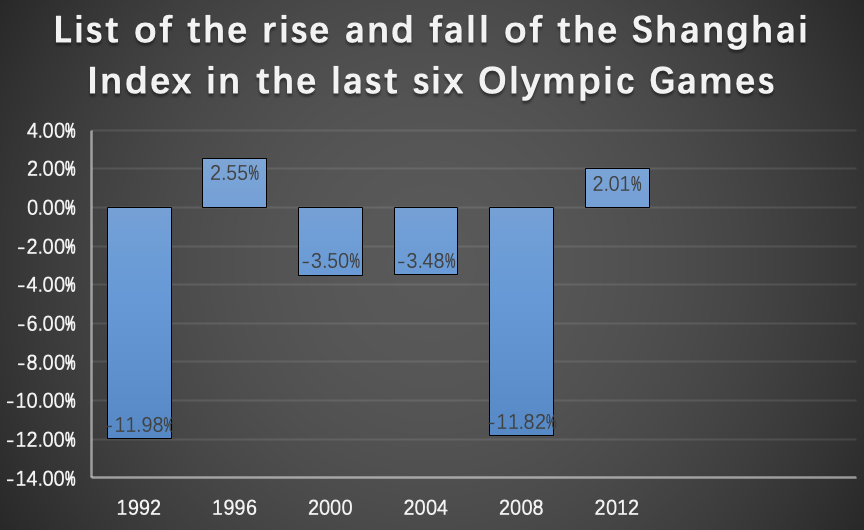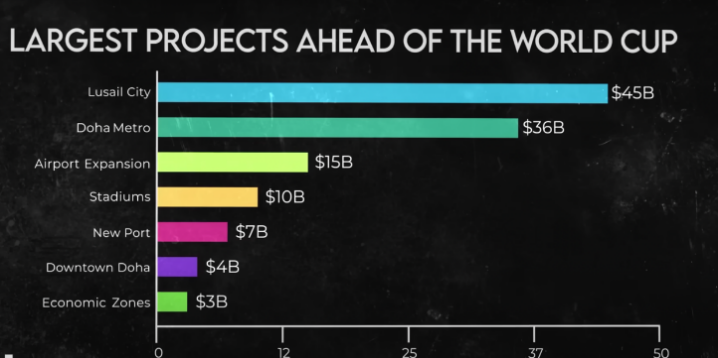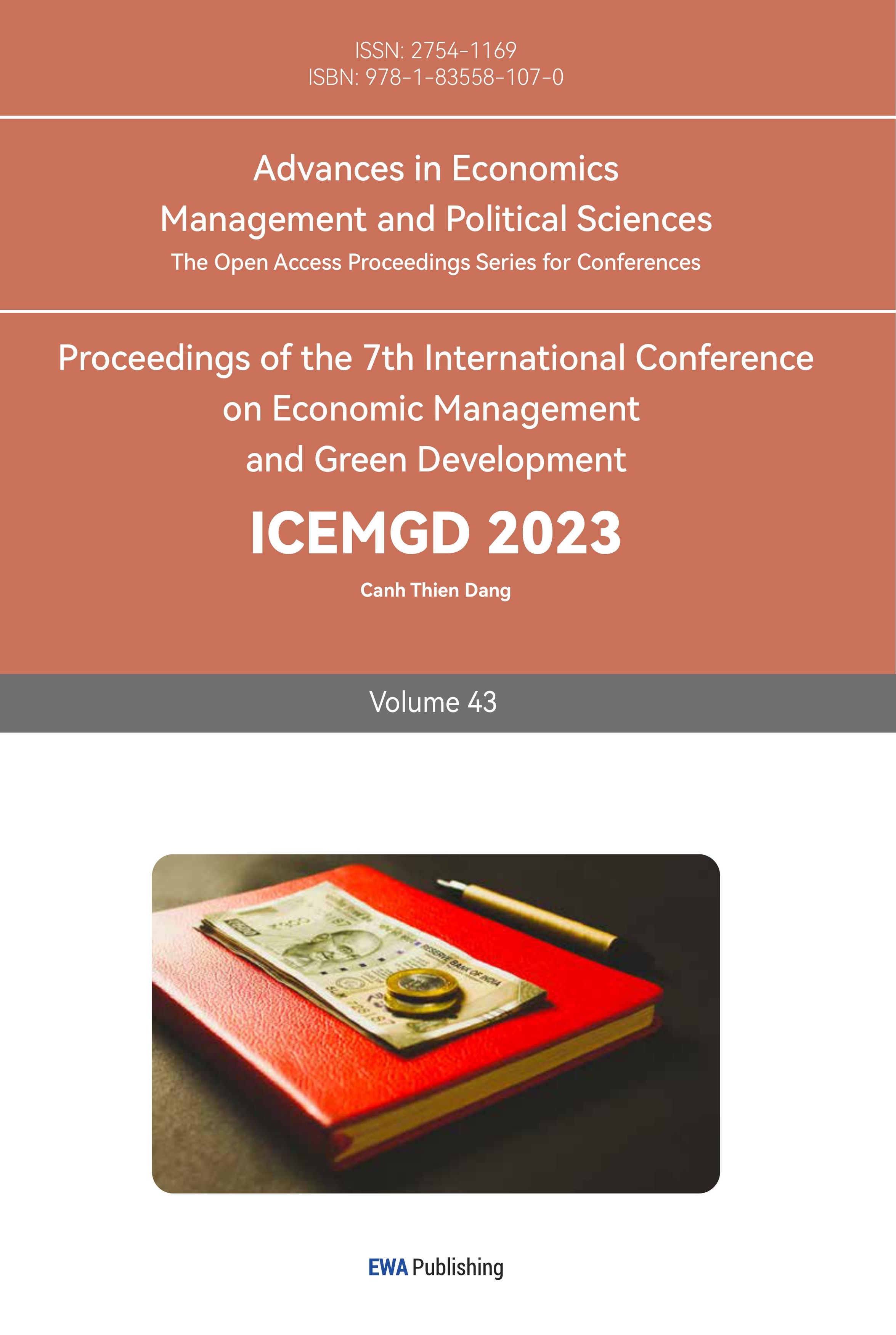1. Introduction
Today's mainstream sporting events, whether it's the English Premier League, National Basketball Association or Formula 1, can be seen with different faces in the arena. With athletes from all countries gathered in the same game and the eyes of the world on them, more and more people are getting involved in sports as this following becomes bigger and bigger. Whether it is the love of sports or the interest in one's own country's athletes, sports are becoming an increasingly important component of society. During the Olympics, however, the stock market slump due to winning gold medals has largely not rebounded, which means that while it is exciting for one's country to win gold medals, it is really not a very good message for the stock market. In 2018 and the previous Olympics, for example, for every gold medal won by the United States, S&P 500 companies traded nearly 3% lower the next day. For Germany and South Korea, that decrease was even higher, at 6.7% and 7.3% [1], respectively. And the main reason for the drop in trading volume is those investors, like the entire population, are focused on the Olympics and are distracted by stock market fluctuations, with distractions increasing with sports success. The central idea of the study is not really new. This paper analyzed the impact of sports on various aspects of society from an economic and financial perspective. Examining how sports affect the economy and maximize the benefits to society, as is a major issue that deserves to be explored in depth, as it is reasonable development planning for a society to have the greatest positive impact.
2. The Impact of Sports Events on Financial Markets
When it comes to finance, it is naturally impossible to avoid the stock market, so this paper takes the impact of sports events on the stock market as the target of my research. In common perception, sports and finance are two different industries, but there is indeed a delicate relationship between them. Therefore, since the relationship between sports and finance, it is necessary to choose an event that has a wide audience and is representative, and the Olympic Games is a natural priority.
When a country wins many Olympic medals, the trading volume of the national stock market will decrease, in the stock market when the market is no longer active, the whole stock market will be in a downturn, and the stock market in general when a country's economy is stable, social stability, the stock market will experience a rebound after the downturn, that is, after the decline ushered in a substantial increase.
The phrase "bread and circuses" has been used since Roman times to describe how public games and other mass spectacles can divert attention [2]. The idea is still very popular today, as exemplified by the popular three-part film series The Hunger Games. In the movie, the dictator holds the Hunger Games to distract people to reduce their rebellion, while in the stock market people's attention is distracted by the Olympics, so the stock market mostly declines during the Olympics. This shows that sporting events such as the Olympics do not tend to have a positive effect on financial markets. As shown in Figure 1, Basically, during every Olympic Games, the stock market is in a downward spiral.

Figure 1: List of the rise and fall of the Shanghai Index in the last six Olympic games [3].
3. The Impact of Sporting Events on the Surrounding Economy
For many cities, compared to their culture, local sports teams are often more representative of them to be remembered by foreigners, like many British and Spanish teams, both in the economy and culture are not outstanding in the world, like Barcelona, Liverpool, these cities if not a team may be difficult to be known by foreigners. So, since sports are so important for the promotion of these cities, do sports competitions play such a big role in local economic development?
Numerous studies have shown that hosting sporting events can promote the political, economic and cultural development of a city and can lead to the advancement of a range of related industries. Studies have shown that the direct economic impact of the Sydney Olympics in 2000 was more than $6 billion, and the total benefit was more than $18 billion, which was 1% of Australia's national GDP in 2000 and would have an impact on Australia's economy for the next 12 years, and was a significant foreign exchange earner for the tourism industry, with revenues of more than $4 billions [3]. From these figures, it seems that major sporting events can have a significant impact on the economic development of cities, but is it really as big as it seems?
In recent years, the global 2020 March, because of the arrival of the epidemic, the professional sports world stopped, European soccer, NBA and NFL, as well as MLB and other major leagues, have suspended the game. The global economy is also in serious recession at this time, many cities because the serious economic recession led to the brain drain and other kinds of problems, and the economic recession of these cities and suspension of sports events is there a relationship. According to research, it can be seen that Liverpool Football Club (LFC) commissioned a study by Deloitte Sports Business Group, which found that the team added $662 million to Liverpool's economy in the 2017-18 season, and whether this seemingly small amount of revenue represents the vital role that sports play for the local economy. [4] In fact, according to an analysis of the data, the total revenue of Chicago's five major professional sports teams combined is less than 0.5 per cent of the city's business revenue. Therefore, the financial impact of losing sports is insignificant compared to the overall impact of the epidemic on restaurants and tourism that led to the shutdown of sporting events.
Given this, what does the reality look like? Not only do sports bring growth to local coffers, but local governments also subsidize the construction of stadiums and give tax breaks to sports teams with the goal of using sports as an economic stimulus, the problem with studies that do this is that they usually assume that all the money spent on sports teams evaporates if it is not spent in stadiums or outside bars and restaurants. But the truth is that most of the money spent on sports just crowds out the money spent on other entertainment.
Because people have entertainment budgets, if they don't spend their money on sports, they'll find a way to spend it on something else. For example, if I plan to earn $3,000 a month and save $2,500, then the rest of the money will definitely be spent on either food or entertainment or watching sports so that leftover money will translate into local revenue even if it's not spent on sports. All in all, sports can indeed have a good impact on the local community, but it is difficult to pull the economy of a region by virtue of sports.
4. The Contribution of Increased Financial Pressure to Major Sports Events
Every four years, the world's best athletes gather in a newly built stadium to compete for their country's great glory, and what brings these athletes together are major international events such as the Olympics or the World Cup. It is well known that being able to host major events is a sign of strength and something to be proud of, but many people overlook how the Olympics can affect a country.
On November 20, 2022, the most expensive soccer World Cup in history kicked off. In order to host this World Cup, the host Qatar spent more than $220 billion, almost five times the sum of the costs of the previous seven World Cups and even more than Qatar's total GDP last year! But the projected revenue that can be achieved is only $17 billion. Russia's World Cup, once called the "most profitable ever", contributed only 1.1% to GDP. But the expenditure of the Qatar World Cup is more than a full year of GDP, the development of this World Cup from the surface for Qatar is more harm than good, and that is really so wasting.
First of all, in order to figure out what impact the World Cup has on Qatar, it is inevitable to figure out where they spent the $220 billion in expenses. The first is the essential stadium construction, which is indispensable for any major sporting event, and this time Qatar built eight brand new soccer stadiums, and installed a complete air conditioning system and cooling system in each of them. But even with these eight stadiums being so advanced, the development costs of the stadiums only accounted for 3% of the total cost. Where is the rest of the money spent? [6] The city was divided into 19 districts, including commercial areas, amusement parks, shopping malls, etc. The city is also equipped with the world's most advanced cooling facilities, and all of these were built in just 15 years. The cost of building the city accounted for about 20% of the World Cup spending, as the remaining costs are mainly focused on the construction of hotels, transportation, and shopping centers within the city [7]. So, it shows that most of the money is actually spent on places other than hosting the tournament, but even after these expenses for Qatar is still not enough to make ends meet, so the Qatari government decided to host the World Cup is it simply love soccer? Obviously not, As shown in Figure 2, Qatar's vision for the future of the country, is to create a sustainable society, and wants to achieve this goal only one way to achieve this is to hold the World Cup.

Figure 2: Largest projects ahead of the world cup [8].
Qatar is known to be a desert city, with a harsh environment, poor economic base and various disadvantages, but they have one very prominent advantage - they have money. Their money comes mainly from the sale of natural gas, but in order to achieve long-term sustainable development, they need to get rid of their over-dependence on natural gas and focus on business and high-tech industry development. No company would want to set up in a desert city like Qatar, so if Qatar wants to attract investment, it must first change itself and then change the perception of the outside world, and the World Cup is a good opportunity to do so. The World Cup was a great opportunity for the world to see a prosperous Qatar and for them to use the World Cup to improve their infrastructure and lay the foundation for their future development [9]. Overall, although the World Cup is very costly for a country and the short-term returns are minimal, it can help the country achieve its goals to a certain extent and better contribute to the country's development and prosperity.
5. Conclusion
Sports events are naturally beneficial to society, but at the same time, major sporting events can generate huge expenses, cause fluctuations in financial markets, and even have drastic effects on the national economy if not properly controlled by the government. Therefore, it is important to understand the role of sporting events at a macro level and analyze the role of different events in detail in order to achieve the goals of the plan. In this paper, a comparative analysis method is chosen, and although the argumentative process is easy to understand, it may also ignore some of the external influences on the data, so the real data may deviate from the one in the article. Future research processes should try to eliminate external influences and argue the conclusion with real data.
References
[1]. Jessica Y. Wang & Raphael N. Markellos (2018): Is there an Olympic gold medal rush in the stock market? The European Journal of Finance .
[2]. Laurie L. Dove. What does ‘bread and circuses’ mean? [M]. Nov 11, 2022.
[3]. Fang Zhuangyu. Big data prediction: this year A shares will break "the magic spell of the Olympic Games big fall" China Business Information Network.
[4]. Matt Crowe. The Economic Impact of the Sydney Olympic Games. A Collaborative Study by NSW Treasury and The Centre for Regional Economic Analysis University of Tasmania, 1997.
[5]. Dan Kopf Why economists don’t think sports matter for the economy. 2020.
[6]. Dario Silic. Is the FIFA World Cup 2022 in Qatar profitable? 2022.
[7]. Logan Carney. The Economics Behind the FIFA World Cup Qatar 2022. BRB SHORTS, ECONOMICS, 2022.
[8]. Jessica Y. Wang & Raphael N. Markellos (2018): Is there an Olympic gold medal rush in the stock market? The European Journal of Finance.
[9]. Mohammad Haris.Most-Expensive Tickets, $220 Billion Spent, Infra Boost: The Economics of FIFA World Cup Qatar 2022. NOVEMBER 19, 2022.
[10]. Simeon Kerr. Qatar’s $200bn bet on the World Cup. 2022.
Cite this article
Sang,T. (2023). The Analysis of the Impact of Sports Events on Socioeconomic Development. Advances in Economics, Management and Political Sciences,43,133-137.
Data availability
The datasets used and/or analyzed during the current study will be available from the authors upon reasonable request.
Disclaimer/Publisher's Note
The statements, opinions and data contained in all publications are solely those of the individual author(s) and contributor(s) and not of EWA Publishing and/or the editor(s). EWA Publishing and/or the editor(s) disclaim responsibility for any injury to people or property resulting from any ideas, methods, instructions or products referred to in the content.
About volume
Volume title: Proceedings of the 7th International Conference on Economic Management and Green Development
© 2024 by the author(s). Licensee EWA Publishing, Oxford, UK. This article is an open access article distributed under the terms and
conditions of the Creative Commons Attribution (CC BY) license. Authors who
publish this series agree to the following terms:
1. Authors retain copyright and grant the series right of first publication with the work simultaneously licensed under a Creative Commons
Attribution License that allows others to share the work with an acknowledgment of the work's authorship and initial publication in this
series.
2. Authors are able to enter into separate, additional contractual arrangements for the non-exclusive distribution of the series's published
version of the work (e.g., post it to an institutional repository or publish it in a book), with an acknowledgment of its initial
publication in this series.
3. Authors are permitted and encouraged to post their work online (e.g., in institutional repositories or on their website) prior to and
during the submission process, as it can lead to productive exchanges, as well as earlier and greater citation of published work (See
Open access policy for details).
References
[1]. Jessica Y. Wang & Raphael N. Markellos (2018): Is there an Olympic gold medal rush in the stock market? The European Journal of Finance .
[2]. Laurie L. Dove. What does ‘bread and circuses’ mean? [M]. Nov 11, 2022.
[3]. Fang Zhuangyu. Big data prediction: this year A shares will break "the magic spell of the Olympic Games big fall" China Business Information Network.
[4]. Matt Crowe. The Economic Impact of the Sydney Olympic Games. A Collaborative Study by NSW Treasury and The Centre for Regional Economic Analysis University of Tasmania, 1997.
[5]. Dan Kopf Why economists don’t think sports matter for the economy. 2020.
[6]. Dario Silic. Is the FIFA World Cup 2022 in Qatar profitable? 2022.
[7]. Logan Carney. The Economics Behind the FIFA World Cup Qatar 2022. BRB SHORTS, ECONOMICS, 2022.
[8]. Jessica Y. Wang & Raphael N. Markellos (2018): Is there an Olympic gold medal rush in the stock market? The European Journal of Finance.
[9]. Mohammad Haris.Most-Expensive Tickets, $220 Billion Spent, Infra Boost: The Economics of FIFA World Cup Qatar 2022. NOVEMBER 19, 2022.
[10]. Simeon Kerr. Qatar’s $200bn bet on the World Cup. 2022.









